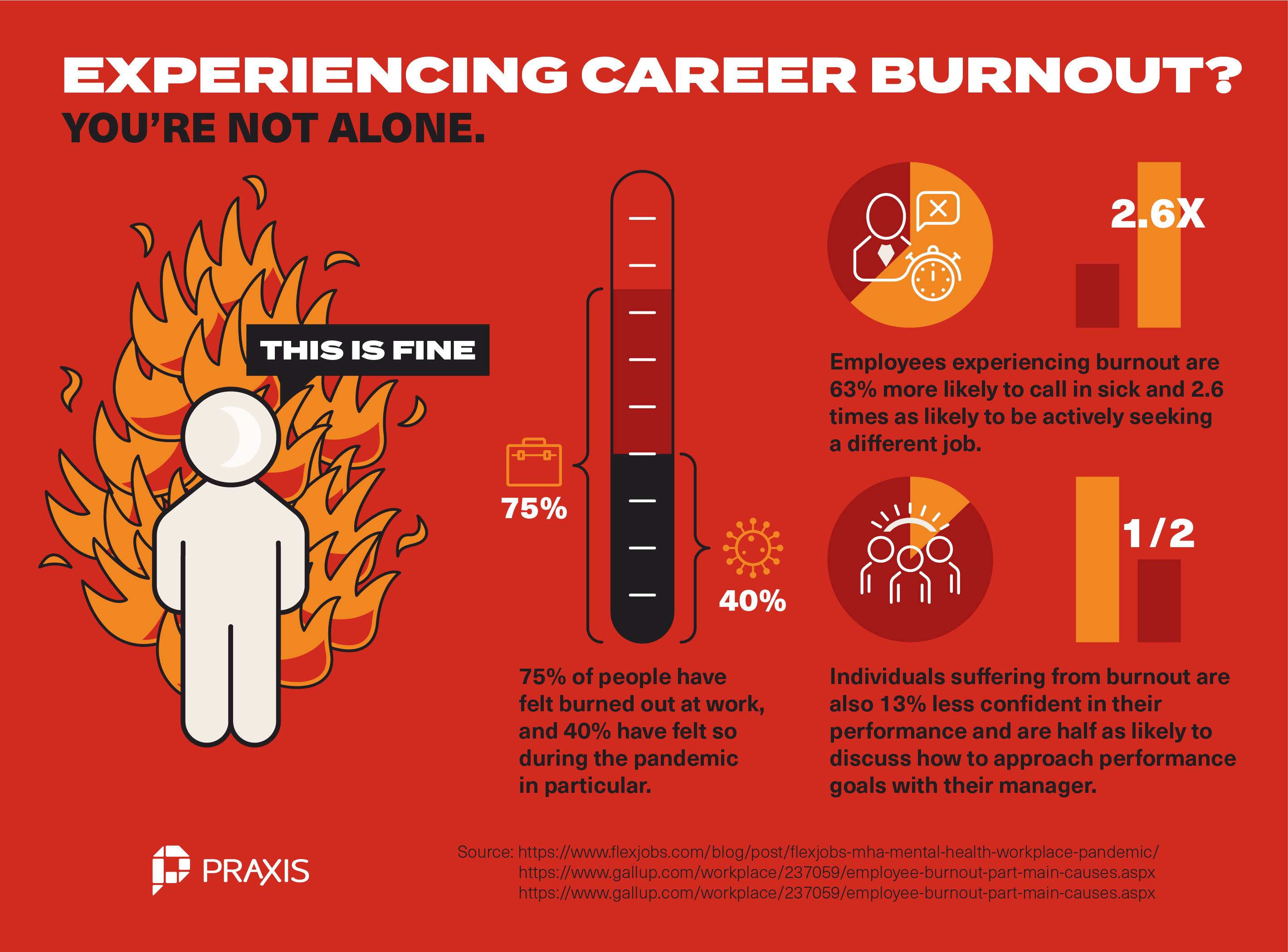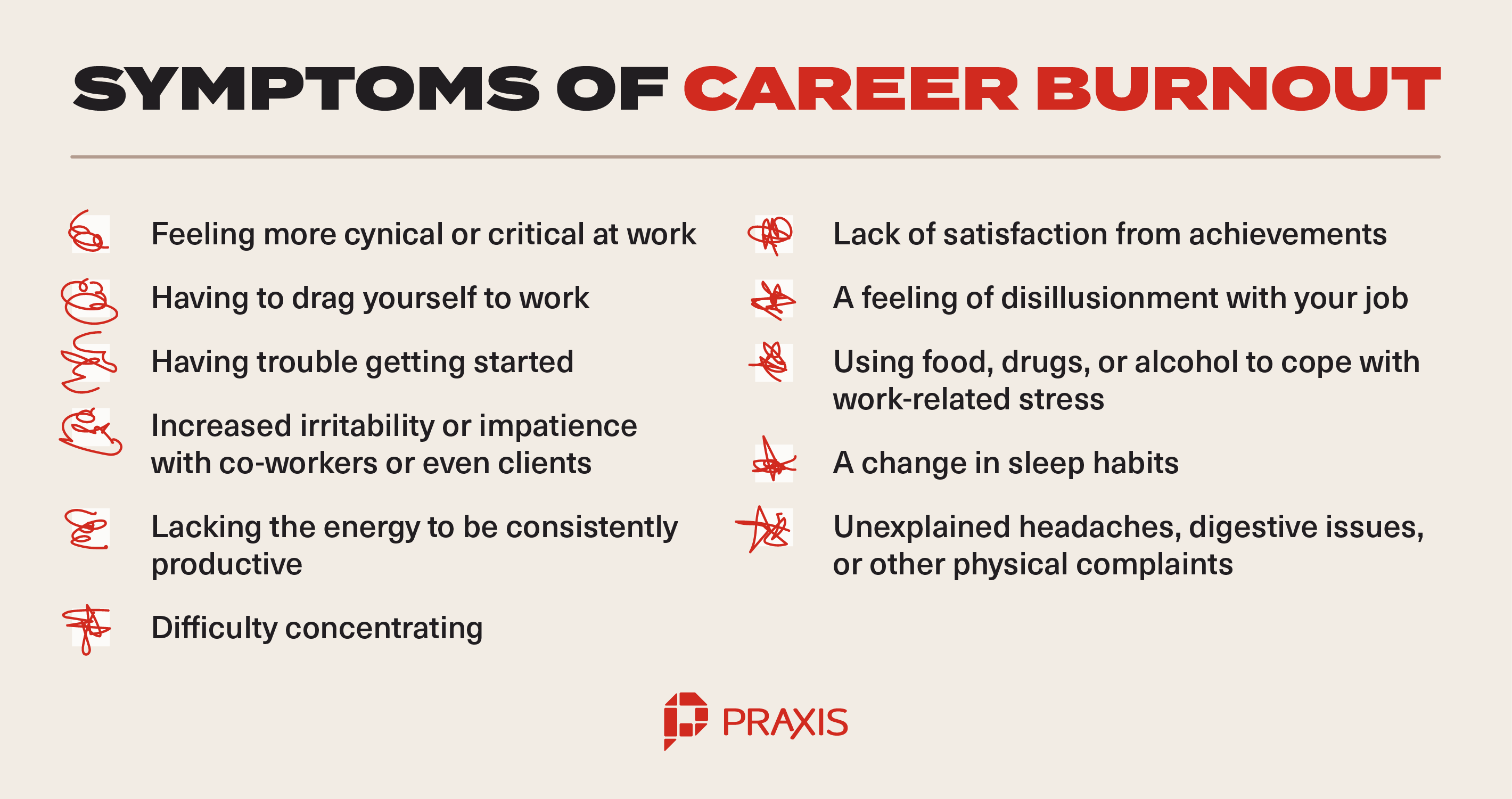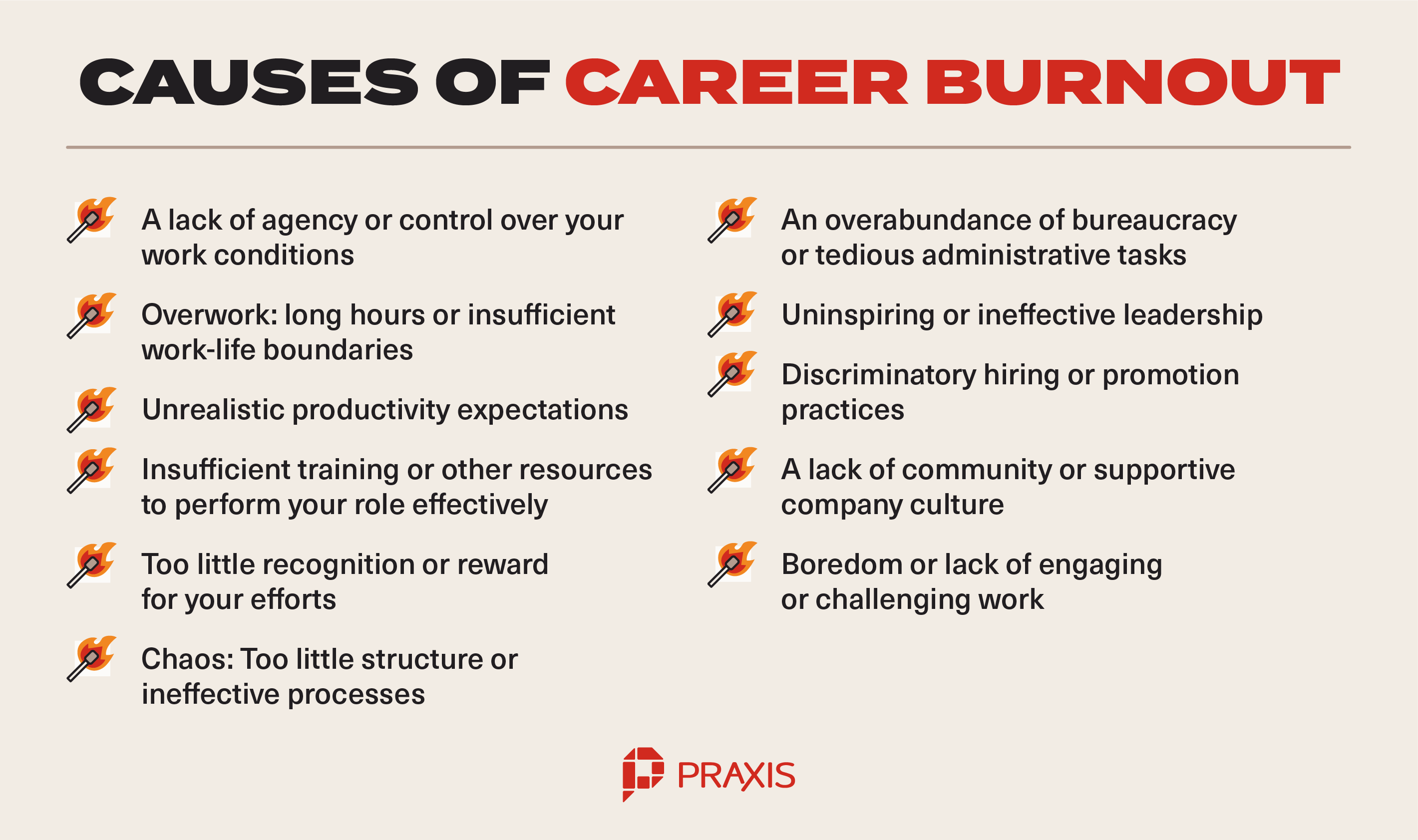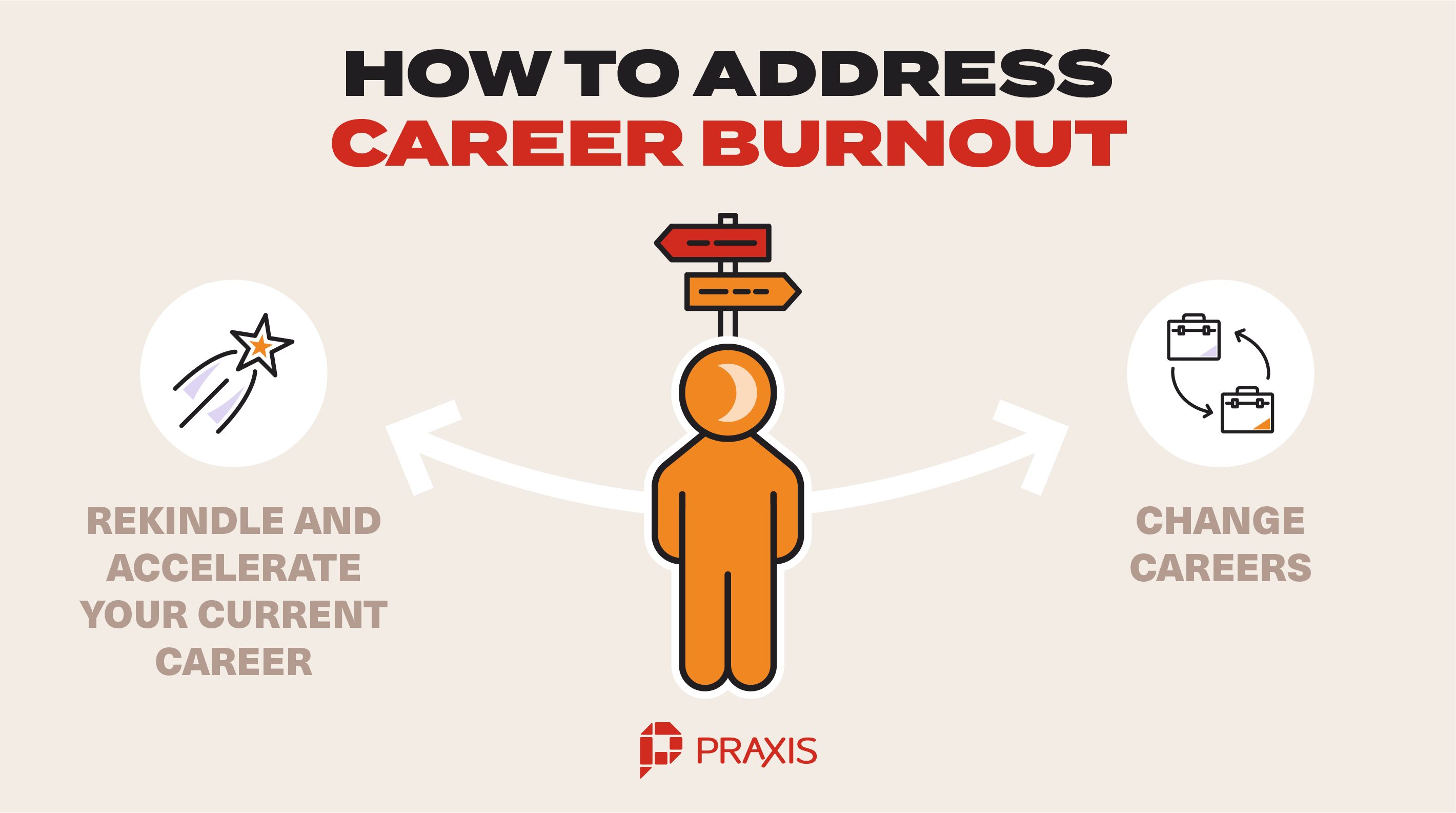When you started your job, odds are, you were fired up and ready to kick ass. You were dedicated to your work and felt like nothing could stop you.
But now, a few years (or even months!) down the line, you find yourself counting the hours to Friday afternoon and daydreaming about your next vacation.
Where did all that motivation go? Why are you struggling to focus on work that used to excite you? And why are you so tired all the time?
It sounds like you might be experiencing career burnout. Career burnout is a very common but serious occurrence that can lead to anxiety, sleep disorders, feelings of depression, or even physical health issues – not to mention a drop in efficiency and productivity and a lack of time (and energy) to spend with loved ones.
Keep reading to find out what exactly career burnout is, what causes it, and how to treat it.
What is Career Burnout?
The term “burnout” was coined in the 1970s by psychologist Herbert Freudenberger.
Working in a New York substance abuse clinic, Freudenberger observed something alarming.
Over time, the clinic’s most dependable and enthusiastic staff would seem to wilt before his eyes.
Once-cheerful employees would become cynical and lose their charisma – and even display signs of illness. In spite of this dramatic change in demeanor, they continued to pile on their volunteer hours, all the while becoming less effective at their work as they grew more exhausted. Freudenberger recognized these symptoms because he had experienced them himself. He called the phenomenon “burnout” and decided to investigate to attempt to understand what caused exemplary clinic employees to lose their spark. What he found was that the staff who were the most invested in the outcomes of their work – and consequently gave the most of themselves to their work – were the hardest hit.
In his book Burnout: The High Cost of High Achievement, Freudenberger theorized that burnout is “a state of fatigue or frustration brought about by devotion to a cause, way of life, or relationship that failed to produce the expected reward.”
Career burnout is so widespread in today’s workplace that the World Health Organization (WHO) in 2019 recognized it as an occupational phenomenon and included it in the 11th Revision of the International Classification of Diseases.
It is described as “a syndrome conceptualized as resulting from chronic workplace stress that has not been successfully managed.”
According to the WHO, career burnout is characterized by three dimensions:
- feelings of energy depletion or exhaustion
- increased mental distance from one’s job, or feelings of negativism or cynicism related to one’s job
- reduced professional efficacy
Burned Out or Just Tired?
So how do you know whether you’re experiencing burnout or you’re just tired? The Mayo Clinic recommends asking yourself the following questions:
- Have you become cynical or critical at work?
- Do you drag yourself to work and have trouble getting started?
- Have you become irritable or impatient with co-workers, customers, or clients?
- Do you lack the energy to be consistently productive?
- Do you find it hard to concentrate?
- Do you lack satisfaction from your achievements?
- Do you feel disillusioned about your job?
- Are you using food, drugs, or alcohol to feel better or to simply not feel?
- Have your sleep habits changed?
- Are you troubled by unexplained headaches, stomach or bowel problems, or other physical complaints?
If you answered yes to most of these questions, you may be experiencing burnout.
What Causes Career Burnout?
So it seems pretty clear that career burnout is caused by prolonged work stress. But what specifically causes this stress?
Some of the contributing factors to career burnout include:
A Lack of Agency or Control Over Your Work Conditions
When you feel like you don’t have a say in your work or the conditions you work under, it’s difficult for even the most enthusiastic employees to remain excited about their work. It’s natural to want ownership of your work and for your employers to trust you with responsibility.
Overwork: Long Hours or Insufficient Work-life Boundaries
Working overtime from time to time is one thing, but when it happens too frequently, it can drain your energy and interfere with your home life, cutting into the time you spend with loved ones and pursuing the hobbies that usually re-energize you.
Unrealistic Productivity Expectations
Whether it’s due to bad resource planning leading to projects being chronically understaffed or a competitive culture that always demands 120% from employees, constantly striving to live up to unrealistic expectations can lead to burnout, especially if you start to feel like the organization is taking advantage of you. When you’re overstretched and struggling to complete your workload in time, the quality of your work is likely to drop, which in turn affects your pride in your work.
Insufficient Training or Other Resources to Perform Your Role Effectively
There are few things as demotivating as being eager to do a great job and not being properly equipped to do so, whether it’s insufficient training or resources.
Too Little Recognition or Reward for Your Efforts
Feeling like your hard work goes unseen can make most people feel unappreciated. If you’re performing at 110% but your colleague is coasting by – or worse, being praised – for giving 50%, it’s understandable that you’re frustrated.
Chaos: Too Little Structure or Ineffective Processes
Working in an environment where everything is subject to change at a moment’s notice, or where the same process is never followed twice, or your role and objectives aren’t clearly defined, can create uncertainty and stress.
An Overabundance of Bureaucracy or Tedious Administrative Tasks
Nobody likes to feel like they’re wasting their time. When your days are filled with mindless admin that could easily be avoided, or you need 3 levels of approval for every little decision, you may start feeling like you’re banging your head against a wall.
Uninspiring or Ineffective Leadership
There are few things quite as frustrating as feeling like your manager is holding you back. Whether it’s because they’re an ineffective or indifferent leader or because they have it in for you, bad leadership can make you feel trapped.
Discriminatory Hiring or Promotion Practices
Working in an environment where unfair treatment or discrimination is evident can be incredibly discouraging, even if you’re not the one being passed over for promotions or ignored in meetings. Simply knowing that this kind of behavior is condoned may be enough to make you lose respect for the organization.
A Lack of Community or Supportive Company Culture
When your workplace has a toxic “every man for himself” culture, it’s difficult to feel psychologically safe and do your best work. Not to mention that given the fact that we spend about half of our waking hours at work, it can be very lonely not to feel a sense of camaraderie or community with your colleagues.
Boredom or Lack of Engaging/Challenging Work
When your work isn’t engaging or challenging enough, it’s easy to become bored and fall into a rut that can be very difficult to get out of.
How to Fight Career Burnout
Burnout sucks, so once you notice it, don’t let it go on too long. But how do you fight it?
Often, people will advise you to take a vacation. While a break will certainly do you good, getting away treats a symptom (the exhaustion you’re feeling), not the cause. To really fight burnout and come out on top, you need to identify and address the underlying cause. So if you do take a break, use the time to clear your head and analyze what’s making you feel this way, and come up with a game plan to address the problem.
There are two broad approaches to fighting career burnout, namely rekindling and accelerating your career, and changing careers.
Path 1: Rekindle and Accelerate Your Career
Sometimes burnout can disappear if only you get a new challenge to reignite your love for your work or change your perspective by setting new goals and putting in the work to accelerate your career.
This path is a good choice if the reason you’re feeling burned out stems from a cause like overwork, a lack of control over your work, or other causes that can be addressed by changing your own behavior.
If your burnout stems from a toxic work environment or bad leadership and you can’t see how anything you could do could change that, changing jobs (not careers, see below) is probably for the best.
Analyze your goals and priorities and evaluate whether it’s possible to bring about meaningful changes in your work situation that would put you on the path to reaching your goals. This might require changing your role, learning a new skill, or simply asking for more responsibility.
For detailed tips on this approach to fighting burnout, read https://discoverpraxis.com/blog/9007/accelerate-career.
Path 2: Change Careers
Sometimes burnout is a clear sign that you need to change careers – that is, shift to an entirely different type of work. Changing careers may seem like leaping off a cliff after dedicating X number of years to a specific field, but wouldn’t you rather take a risk that could lead to a job you love than stagnate in a job that makes you feel dead inside?
You’re not alone. The average person changes careers 5-7 times throughout their working lives.
The good news is you don’t need to go back to school to change careers. With some self-reflection, dedication and hard work, you can teach yourself everything you need to know by embracing self-directed education.
That hint of complacency or hesitation you’re probably feeling is fear. It’s natural to be afraid of the unknown. Luckily, you’re not the first person to go through this, which means there are plenty of people and resources that can help you figure it out.
If you’re feeling stuck and you’re looking for guidance and support as you get in the driver’s seat of your career, Praxis might be exactly what you’re looking for.
Praxis is a college alternative that helps driven individuals take charge of their lives and unlock a career they love. The year-long Praxis program offers a combination of job training, mentorship, job placement, and ongoing job-support, as well as life-long access to an inspiring community of ambitious professionals.
Thinking of making a change? Read Changing Careers: The Ultimate Guide to Taking the Leap.
Tags:
Career DevelopmentMarch 9, 2021
